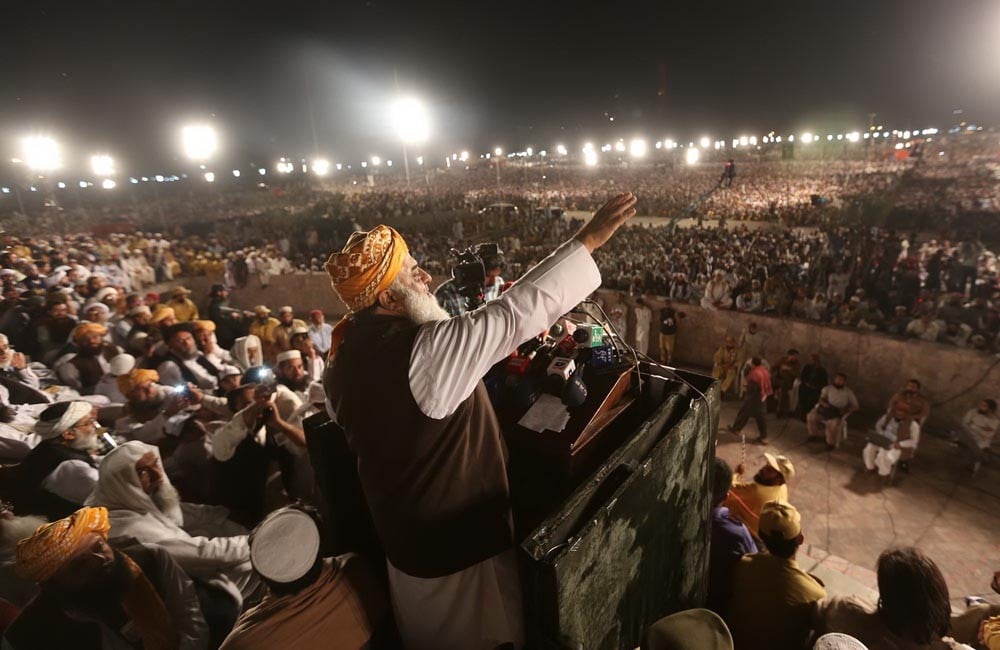
The growing influence of JUI-F in Sindh has compelled the ruling PPP to enter into an electoral alliance with it

The ruling Pakistan People’s Party (PPP) has recently announced an electoral alliance with the Jamiat-e-Ulema-e-Islam-Fazl (JUI-F), a leading religio-political party, in the upcoming local bodies polls in Sindh scheduled to be held in September.
In some districts of Northern Sindh, the process of seat adjustments at district, tehsil and union council level between the two parties is in progress. Aftab Shaban Mirani, the PPP MNA from Shikarpur, who recently attended a meeting with the JUI-F leaders in the district, says that his party has entered into an alliance with the JUI-F on the directives of the party high command regarding seat adjustment.
The PPP’s current decision to make alliance with the JUI-F indicates that after Khyber Pakhtunkhwa, FATA, Pashtun and Brahui-speaking parts of Balochistan, the latter has emerged as an effective political force in the Sindh’s northern part that includes Shikarpur, Larkana, Jacobabad, Sukkur, Khairpur and Ghotki.
Led by Maulana Fazlur Rehman, the JUI-F follows the Deobandi school of thought. It primarily functions as an ‘electoral party’ where success in elections, no matter how limited, provides the party the opportunity to form government at provincial and federal level. This gives the party resources and power.
Riaz Sohail, a journalist who covers Sindh province for the BBC, says that the JUI-F has traditionally remained active in northern parts of Sindh. "Before partition, the Jamiat Ulema-e-Hind had a significant presence in the province’s northern parts but it was not active in lower Sindh that is Hyderabad, Badin, Mirpurkhas and Dadu," Sohail tells TNS. He says in recent years the party has gained ground, especially under the leadership of Maulana Khalid Mehmood Soomro. Soomro was killed in Sukkur by unknown assailants in November last year.
Ayesha Siddiqa, a political scientist who has been monitoring Northern Sindh extensively, believes the JUI-F is increasingly filling a vacuum of an alternative political force in the region. "The need for a political alternative force and growing radicalism in Sindh is making the JUI-F increasingly relevant in the province. The votes they get from Larkana, the constituency of late Benazir Bhutto, and other neighbouring districts, have increased consistently."
Interviews with political and civil society activists in Shikarpur, Larkana and Jacobabad suggest that there are many factors behind the strengthening of the JUI-F in the region. They say the PPP-led Sindh government failed to improve basic infrastructure or provide jobs in the public sector. This has increased poverty. It’s the poor people in the region who are attracted towards religious parties such as the JUI-F.
"Corruption, bad governance and neglect of people have significantly weakened the PPP at organisational and support level in Northern Sindh. It has created a vacuum which the JUI-F has successfully been trying to fill. This is the reason that has compelled the PPP to make coalition with the JUI-F to win local bodies’ elections -- to counter the locally formed anti-PPP alliances at district levels across the province."
Fierce tribal clashes between chieftains in Northern Sindh are also compelling local people to join the JUI-F for protection from excesses of powerful tribal chief. About 2290 people have been killed in tribal clashes in Sindh in five years (2010-2014), state the statistics compiled by Jan Odhano, a Jacobabad-based civil society activist.
Most violence was reported from Shikarpur district where 452 people were killed in tribal clashes in five years. Odhano says that those killed were mainly poor and innocent people in furious armed clashes. Police and civil administrations cannot protect someone from fight between tribal chieftains.
"It is only the JUI-F’s madrassas from where you can get protection from tribal sardars," says Arshad Arain, a trader in Khanpur town of Shikarpur, who lost some of his family members in a clash with powerful Jaotis. Today, the JUI-F is the single powerful political party in Khanpur supported by the poor and lower middle class because there is no forceful alternative, he says.
The JUI-F, across the country, mainly derives its support from its connections with the madrassas. In Northern Sindh, the JUI-F has established a network of big madrassas mainly on highways and entrance and exit points of all districts. Paryal Mari, a Shikarpur-based civil society activist, says that the madrassas in the region have forcibly been involved in stopping cultural activities.
"After mushroom growth of madrassas, we have also seen rise in militancy in the region," says Mari. More than sixty Shia worshippers were killed in an attack on Imambargah in Shikarpur in late January this year. Also, attacks on politicians and Sufi leaders were reported in the region in recent times.
The JUI-F in Northern Sindh is different from those in the rest of the country. Siddiqa says that it is because its leadership has a mix of religion and Sindhi nationalism and it is far more responsive to local political needs.
Sohail traces the reasons for JUI’s popularity in history. He says that the JUI-F’s Sindh leadership fully participated in the populist MRD movement against Ziaul Haq’s dictatorship and also took part in rallies against ‘anti-Sindh’ projects such as Kalabagh Dam, the NFC Award and division of province.
"Under the cover of pro-Sindh politics, the JUI-F had successfully become an influential stakeholder in Sindh’s politics and spread the madrassas’ network from Kacha’s area to deserts of Thar. This is why Sindh’s nationalist parties have also abandoned their resistance against its influence and instead made electoral alliance with the JUI-F in last general elections," he says.